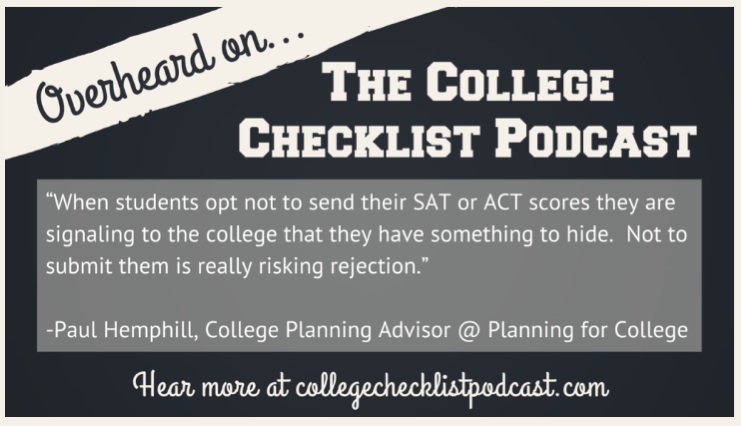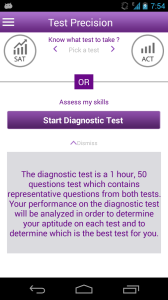 When it comes to standardized testing, SAT and ACT anxiety is the elephant in the room. No matter how thoroughly you address the material, strategic, and timing-based demands of these exams, the potential for anxiety-induced problems remains.
When it comes to standardized testing, SAT and ACT anxiety is the elephant in the room. No matter how thoroughly you address the material, strategic, and timing-based demands of these exams, the potential for anxiety-induced problems remains.
Many parents and students view testing anxiety as an “intangible” – an issue that can’t be addressed in any sort of reliable or systematic fashion. Fortunately, this isn’t the case. With the right knowledge and procedures, parents can easily make anxiety a non-issue for their children and set them up for the best possible chances of testing success.
A Quick Note: When Anxiety is Real
Everyone on Earth gets nervous. When you get anxious before a big exam, it means that you’re a human being and that your neural and emotional wiring are firing properly. However, some students do have legitimate, diagnosable anxiety issues – levels of anxiousness that become detrimental to normal functioning.
If you suspect that your child has a legitimate anxiety issue (and if you’re a parent, you’ll know), it’s best to consult a licensed psychiatrist or behavioral therapist to figure out your options.
For everyone else, read on!
The Four Factors That Kill Anxiety
- Familiarity
- Preparation
- Keeping Things in Perspective
- Having a Backup Plan
If you address all four, your kid will walk into the SAT or ACT cool as a cucumber. Let’s address all four in a bit more detail:
Familiarity
Have you ever been on a roller coaster? The first time you went on, it was probably horrifying. You didn’t know what to expect, you didn’t know if it was safe – and so you were terrified. By the third time you got on, you were bored. You needed to find a new ride just to maintain some level of excitement.
Tests are the same way. The more you take them, and the more you deal with them, the less frightening they become. Find me a kid who has never taken a full-length practice test before, and I’ll show you a kid who’s terrified of taking the real thing. On the other hand, find me a kid who has already taken ten full-length, timed, graded diagnostics, and I’ll show you someone who’s practically bored by the prospect of these tests.
And that’s what you want your kid to be! If you start the prep process early, and if you make sure to build timed, graded, realistic practice tests into the process, then you’ll build more than enough familiarity to axe anxiety.
Preparation
This is just an extension of familiarity. Have you ever given a presentation without enough prep time? Sweaty palm city. On the flip side, have you ever been nervous to do something that you’d prepared for properly? I doubt it.
The more time you give your child to prepare, and the more consistently he or she studies, the less anxiety you’ll need to deal with. When it comes to these exams, you cannot prepare enough. This seems counterintuitive – don’t “tiger moms” make their kids study for hours on end!? And aren’t their kids nervous wrecks? Actually, the more studying you do, the less nervous you’ll be. “Tiger moms” get a bad rap for another reason, and this leads us right to element #3:
Keeping Things in Perspective
We all know that test scores are important. However, once you’ve set the proper goals with your child, you need to stop talking about them. Once your goals are set, you need to focus on consistent work and on the process, rather than on outcomes.
Want a miserable kid? Focus only on the end result. When he improves by 50 points, don’t congratulate him – just ask him “why he isn’t there yet.” Never reward consistent effort – just scold him for “not improving fast enough.”
If you want a relaxed, confident, and motivated kid, just convey the following:
You love him/her no matter what
You’re proud of all the work that he/she is doing
No matter what happens, he/she is going to get an amazing education
You know that he/she is going to do well!
That’s it. The SAT and ACT aren’t sports – you can’t scream and push your way to victory. These behaviors create adrenaline – fantastic for physical performance, and horrible for mental performance. Trust me: your kid is already feeling enough pressure. Your job is to be a teammate, not a boss.
If you reward consistent labor, keep things in perspective, and give your kid enough runway to get the proper preparation and familiarity built in, only one last element remains:
Have a Backup Plan
When you register for your SAT or ACT, make sure to register for a backup date. This is absolutely essential. Three reasons why:
- Insurance. Your kid might have a bad day – he might get sick, he might break up with his girlfriend the night before, he might pull an all-nighter studying for a chemistry test – who knows! You can’t tell the future, but you can get an insurance policy.
- Statistical variance. Some tests are easier and harder than others for the students who take them. For instance, one test might have more algebra, and another might focus more heavily on geometry – one is going to favor your child more heavily. By taking both tests, you have a better chance of catching the more favorable exam.
- Pressure reduction. Keep all of the points above in mind and you’re going to be dealing with a much more relaxed, centered student. Anxiety is real, but it doesn’t have to be a problem – and by following all these guidelines, you’re sure to keep it at bay!
Keep all of the points above in mind and you’re going to be dealing with a much more relaxed, centered student. Anxiety is real, but it doesn’t have to be a problem – and by following all these guidelines, you’re sure to keep it at bay!
++++++++++++++++++
Anthony-James Green is world-renowned SAT and ACT tutor with over 10,000 hours of experience teaching these tests, crafting curriculum, and training other tutors to teach their own students. He is also the founder of TestPrepAuthority.com. CNN recently named Anthony: “The SAT tutor to the 1%”














